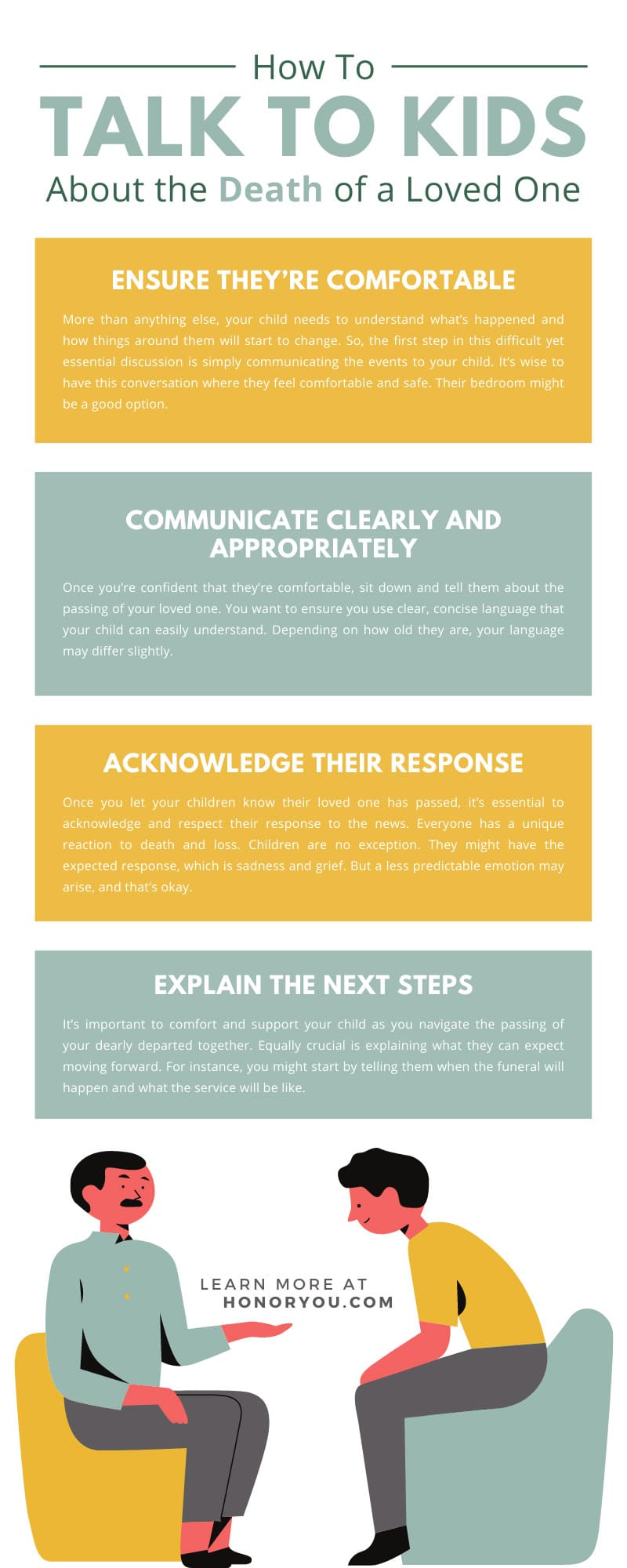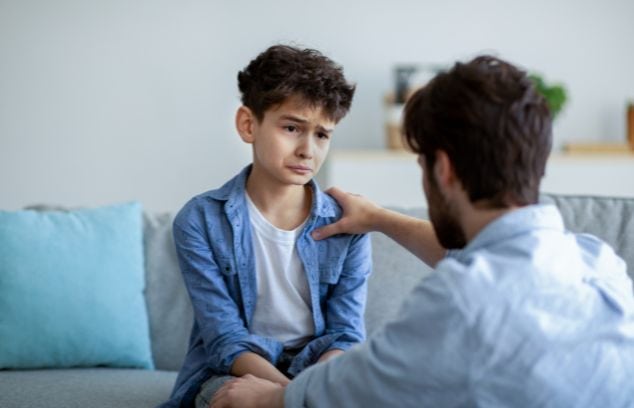How To Talk to Kids About the Death of a Loved One

What To Look For When Choosing a Funeral Home
July 18, 2022
3 Tips for Writing a Poem for a Deceased Loved One
July 27, 2022Few things in this life are more complicated than losing a loved one. You’re responsible for ensuring that their funeral service celebrates them fully and appropriately. You must notify your family, friends, and community members.
Moreover, you must move forward and learn to live without someone you hold close to your heart. Discussing the death of a loved one with your child is perhaps equally challenging. Allow us to assist you in navigating this complex situation with some helpful advice.
Ensure They’re Comfortable
More than anything else, your child needs to understand what’s happened and how things around them will start to change. So, the first step in this difficult yet essential discussion is simply communicating the events to your child. It’s wise to have this conversation where they feel comfortable and safe. Their bedroom might be a good option.
If they have a special playroom or tend to feel safest with you in your space, that will work, too. You might also consider giving them a comfort object like a favorite toy, blanket, or piece of clothing. This will provide an extra layer of comfort if they have an intense emotional reaction to the news.
Communicate Clearly and Appropriately
Once you’re confident that they’re comfortable, sit down and tell them about the passing of your loved one. You want to ensure you use clear, concise language that your child can easily understand. Depending on how old they are, your language may differ slightly.
Here are some examples for each general age group:
Ages 3-5: “Grandma was sick, so the angels took her to heaven. But she’s still watching over us. Do you understand/have any questions?”
Ages 7-10: “Grandma was really sick and passed away. But she’s in a better place now and will always be with us. Do you have any questions or anything you need me to do for you?”
Ages 12+: “Grandma was very sick and passed away. I understand this is very difficult to hear. But she’s not in pain anymore, and she’s always going to be with us. Do you have any questions? Is there anything you’d like to discuss more?”
These are just a few basic examples. You will know the best ways to communicate these events to your children. But using clear language and checking for understanding or opening the floor for them to ask questions is a great place to start.
Acknowledge Their Response
Once you let your children know their loved one has passed, it’s essential to acknowledge and respect their response to the news. Everyone has a unique reaction to death and loss. Children are no exception. They might have the expected response, which is sadness and grief. But a less predictable emotion may arise, and that’s okay.
For instance, they may not react at all. They could also get angry or anxious. Some children have even been known to laugh when first hearing about the passing of a loved one. Be mindful; this doesn’t mean your child isn’t processing what’s happened or taking it seriously. It often indicates the contrary. That’s why it’s so crucial to acknowledge their response, no matter how strange it may seem from your perspective. Doing so ensures that your child feels safe and free to process this life-altering news in a way that makes the most sense to them.
Note: Strange reactions are normal, initially. With that said, it’s wise to keep an eye on your children as their grief develops to ensure they have the tools to heal and process their emotions appropriately.
Explain the Next Steps
It’s important to comfort and support your child as you navigate the passing of your dearly departed together. Equally crucial is explaining what they can expect moving forward. For instance, you might start by telling them when the funeral will happen and what the service will be like.
You could also give them a heads-up about:
- Family members that might be coming to stay with you
- The bereavement process and the progression of their emotions
- More people coming by to drop off food, flowers, donations, etc.
Any information you think your child might benefit from knowing, don’t hesitate to share it with them. It will make it much easier for them to make space for themselves and process their grief if they know what typically happens after the death of a loved one.
Let Them Participate
An important part of talking to your kids after the death of a loved one is asking to see if they’d like to participate in planning the service. Remember, your child has lost someone, too. So, allowing them to take a bit of responsibility for arrangements is a beautiful way for them to honor the memory of the deceased.
This doesn’t mean making them pick the floral arrangements or taking care of the down payment on a casket. But if you’re opting for a casket with pictures on it, maybe let them pick out a couple of their favorites for the display. If they’re older and crafty, your children might also enjoy making keepsake necklaces for you and your family.
The point is to ask if they’d like to participate. If the answer is yes, there are plenty of tasks. So don’t be afraid to give them something stimulating and meaningful to do in remembrance of the person they’ve lost.
Get More Help if You Need To
Communicating and doing everything you can to help your child understand and navigate the passing of your loved one is crucial to their healing. With that said, if you notice that your child isn’t processing their grief or is showing signs of depression, do not try to manage these emotions on your own. We understand—you want to be the person to help your child.
But some emotions are too big to help them process without a professional’s expertise. So, if you think your child could benefit from a bit of extra help, don’t be afraid to consult a grief counselor. They’ll ensure your child has all the best tools and resources to navigate their loss and healthily heal from their grief.



